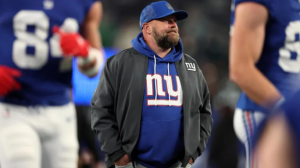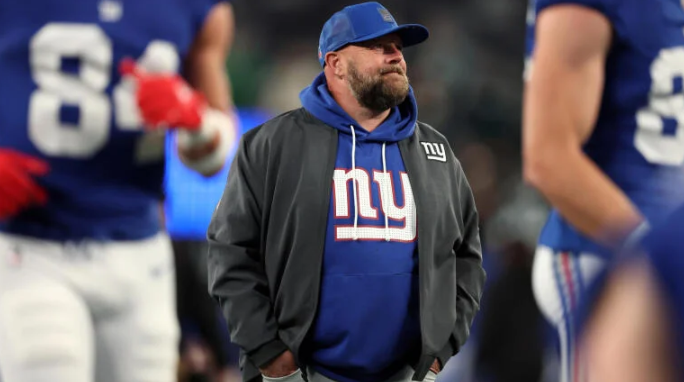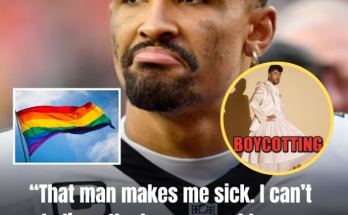
The New York Giants and head coach Brian Daboll have landed in the headlines again — but this time, it’s not about their performance on the field. The National Football League (NFL) has fined the Giants organization and their head coach for violating the league’s strict concussion evaluation protocol during a recent game, reigniting debate about how far teams can go in the heat of competition before crossing the line between passion and professionalism.
The controversy erupted after the Giants’ Week 6 matchup against the Philadelphia Eagles. During the second quarter, rookie quarterback Jaxson Dart took a heavy hit that sent him briefly to the turf. Following NFL safety rules, team doctors escorted him into the blue medical tent on the sideline for an immediate concussion evaluation. Those tents are designed to give medical staff privacy and independence while determining whether a player shows signs of a concussion and whether he can safely return to play.
But what happened next turned into a costly mistake for the Giants. According to multiple reports and game footage reviewed by the NFL, head coach Brian Daboll was seen lifting the flap of the tent and speaking to medical personnel during Dart’s evaluation. Running back Cam Skattebo also entered the tent to talk to his teammate. Both actions are explicitly prohibited under the league’s protocol, which bars coaches and non-medical staff from entering or communicating with players during concussion evaluations.
The league took the incident seriously. After reviewing game footage, sideline reports, and statements from the medical staff, the NFL determined that while Dart’s concussion evaluation itself was properly conducted and his return to the game was medically justified, the actions of Daboll, Skattebo, and the Giants organization violated league rules.
The resulting punishment was significant: the Giants were fined $200,000, head coach Brian Daboll personally fined $100,000, and Cam Skattebo fined $15,000 for entering the tent. In total, the fines amounted to $315,000, one of the largest single-game discipline totals for a concussion-protocol violation in recent years.
The league’s statement emphasized that the punishment was not because the medical decision was incorrect, but because “unauthorized individuals entered the designated medical evaluation area during an active concussion assessment, thereby creating the appearance of interference.” That phrase — “appearance of interference” — has become central to the story. The NFL wants to ensure that medical evaluations remain completely independent, without even the perception that coaching staff might pressure doctors to clear players quickly.
For the Giants, the timing of the fine could not be worse. The team has struggled this season, facing mounting injuries and disappointing results after a promising offseason. Brian Daboll, who won the 2022 NFL Coach of the Year award for turning the Giants into playoff contenders, has been under increasing pressure to restore the team’s momentum. In this light, his decision to approach the medical tent may have stemmed from frustration and urgency — but it’s one that now carries steep consequences.
After the fine was announced, Daboll addressed the media. He didn’t deny what happened. Instead, he took full responsibility, saying: “In the heat of the moment, I made a mistake. I wanted to check on my player, but I understand the league’s position and respect the importance of their protocols. Player safety has to come first, and I accept the league’s decision.”
His apology, though sincere, hasn’t stopped the criticism. Analysts and former players have noted that the concussion protocol is one of the NFL’s most sensitive issues. Over the past decade, the league has invested millions in concussion research, revised return-to-play rules, and faced lawsuits from former players who suffered long-term brain injuries. As a result, the NFL has made it clear that any breach — even one that seems minor — will be met with strong disciplinary action.
From a player-safety standpoint, the rule is simple: coaches are to stay out of the tent. The reason is that even subtle pressure — a glance, a question, a sigh of impatience — could influence the decision-making environment. The independent neurologists and team doctors must feel completely free to prioritize the player’s health over the team’s needs.
The Giants’ organization quickly released its own statement supporting the league’s stance. “We acknowledge the importance of maintaining the integrity of the NFL’s concussion evaluation process,” the team said. “Coach Daboll’s actions, though made with good intentions, were inappropriate. We will reinforce our sideline procedures and provide additional staff education to ensure this does not happen again.”
Despite that, the financial penalties and public embarrassment add to the Giants’ growing list of off-field distractions. Fans have taken to social media with mixed reactions — some defending Daboll’s passion and human instinct to check on his injured player, others condemning what they see as unprofessional behavior that undermines the NFL’s commitment to safety.
Behind the fines lies a larger message from the league. In recent years, the NFL has been increasingly aggressive in policing any violation of medical or player-safety standards. The 2022 incident involving the Miami Dolphins and quarterback Tua Tagovailoa, whose concussion was mishandled, prompted a tightening of policies and more severe penalties for any deviation. The league knows that the public is watching closely, and it cannot afford to appear lenient when it comes to head injuries.
Internally, the Giants are expected to conduct additional training for all sideline staff and install clearer barriers around the medical-evaluation area to prevent unauthorized entry. The team’s medical director, Dr. Scott Meyer, said in a follow-up interview that the staff handled Dart’s evaluation properly and that the coach’s intrusion did not alter the medical decision. Still, he agreed with the league’s assessment that the situation “should not have happened at all.”
This isn’t the first time a team has been fined for similar reasons, but it’s among the most high-profile cases involving a head coach. League sources have said the NFL is making an example of the Giants to reinforce its zero-tolerance policy. Coaches across the league have reportedly been reminded of their responsibilities in official memos following the incident.
For Brian Daboll personally, the fine could sting more than the financial loss. He has built a reputation as a fiery, emotional leader — the kind of coach players rally behind. Yet this event raises questions about whether his intensity sometimes crosses the line into impulsiveness. With the Giants already battling injuries, inconsistency, and a tough schedule, maintaining composure will be critical.
In practical terms, the fines will not cripple the organization. But the reputational hit matters. The Giants’ ownership has long prided itself on professionalism and integrity, and they are now forced to defend their culture at a time when results on the field are already disappointing.
Moving forward, the Giants’ focus will be on avoiding distractions and regaining stability. The team plans to use this incident as a learning opportunity, emphasizing compliance with league rules and respect for medical boundaries. In a sport where passion often collides with regulation, this episode serves as a stark reminder that even well-intentioned actions can have serious consequences.
The NFL, meanwhile, has sent its message loud and clear: player safety and the independence of medical evaluations are non-negotiable. Whether it’s a rookie player, a head coach, or an entire organization, anyone who crosses that line will face accountability.
For Brian Daboll and the Giants, this chapter will likely fade in time — but it leaves behind a valuable lesson. No game, no play, and no moment of urgency outweighs the health and safety of a player. In the high-stakes world of professional football, it’s a rule that every team, no matter how competitive, must remember

